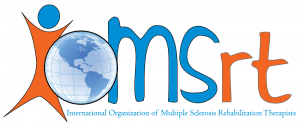The inaugural meeting of the Rehabilitation Research Interest Group (RIG) of the MS Cooperative Studies Group, CMSC was held in Boston, August 17 – 18, 2003. At this meeting, the Research RIG, comprised of 16 rehabilitation professionals from North America, established the mission for the RIG and the specific goals and objectives.
The Boston group identified the first proposal to be investigated by the RIG was to survey rehabilitation professionals to establish the current standard of care in rehabilitation for individuals with MS. A conference was convened in Chicago April 17 and 18 2004 in which a draft consensus statement of outcome measures for rehabilitation in MS was developed. Funding for this conference was provided by the Multiple Sclerosis Association of America (MSAA).
The work completed in Chicago was presented in a poster format at the CMSC meeting in Toronto June 2004 and the consensus statement was adopted by the CMSC Board of Directors in November 2005.
Since that time the members of the RIG have met at the annual conference to discuss current research studies under investigation and identify opportunities for networking for collaboration of clinical research projects. Networking beyond the annual meeting has been difficult and such the development of the Rehabilitation RIG webpage as part of the CMSC website was proposed to the Research Committee in March 2007 and approved.
We are now in the process of working with the IOMSRT to establish the webpage that would include a research page that would facilitate communication of research in rehabilitation of MS and a clinical page for the practicing clinician.
Mission Statement:
The mission of the Rehabilitation Research Interest Group is to strengthen and improve the standard of rehabilitation services to people with MS and their families. The mission will be achieved through the development, conduct and dissemination of research to support evidenced based practice.
Rehabilitation practice in MS is focused on the physical, cognitive, psychosocial, and community-integration needs of individuals with MS and their families.
The primary goals of these activities are to enable people with MS and their families to maximize function, enhance health and wellness, and fulfill their life roles to achieve their best quality of life.
The Broad Objectives of the Rehabilitation Research Interest Group, a multidisciplinary group of health care professionals, are to
- Investigate the standard of care in rehabilitation
- Delivery models o Assessment process/tools ” Training for use and interpretation
- Interventions process/tools o Barriers to care ” Staffing ” Reimbursement
- Maintenance therapy
- Investigate measurement processes and instruments relevant to rehab in MS
- Frequency of assessments
- Psychometric properties
- Validity and reliability
- Clinical utility
- Standardized tools in MS
- Types of tools
- Determining need
- Progress with rehab
- Outcome measures
- Physical
- Cognitive
- Psychosocial
- Community integration
- Family/caregiver involvement (need, burden & benefit)
- Modification and development of tools
- Investigate the efficacy and effectiveness of rehabilitation interventions
- Delivery models
- Interventions focused on physical, cognitive, psychosocial, and community-integration
- physical – balance, gait, spasticity, strength, fatigue, nutrition, dysphagia, dysphonia, dysarthria coordination, visual, functional mobility sensory, ADLs/IADLs, assistive technology, skin integrity, postural control, seating and positioning, health and wellness, cooling strategies, pain management
- cognitive – learning, memory, attention, fatigue ADLs/IADLs, assistive technology, health and wellness (skin integrity)
- psychosocial – fatigue, energy conservation, psychological intervention, assistive technology, functional mobility, communicative interaction, health and wellness, pain management, support group network
- community integration
- driver assessment/intervention
- fatigue, dysarthria, dysphonia, dysphagia assistive technology, functional mobility communicative interaction, health and wellness, home modification and safety, environment, vocational modifications, system change and advocacy
- educate stakeholders on comprehensive rehabilitative care in MS
- Health care professionals
- Family caregivers
- Third party payers
- Case managers

